Photographs: Rupak de Chowdhuri/Reuters Devangshu Datta in New Delhi
The rupee's slide was predictable in direction, if not in timing. It has been obvious for months that India was vulnerable to depreciation. A combination of European weakness and bearish FII attitudes were the triggers.
Once a trend is established, a feedback loop may be established as traders and businesses revise projections and targets. Such feedback loops can make the trend last longer. Given the size of the trade gap, the current account deficit and the fiscal deficit, the rupee was overvalued. It will be undervalued, maybe substantially undervalued, before the slide is arrested.
This is a good thing. Three years of policy drift have let economic conditions deteriorate to this point. A currency slide is more visible than a slowdown and hence, more politically sensitive. So, falling rupee may force the government into some sort of policy action.
...
Traders go long on $-Rupee, short on Euro-Rupee
Image: The rupee's weakness raises the cost of fuel and fertiliser subsidies to politically unacceptable levels.Photographs: Joshua Lott/Reuters
The rupee's weakness raises the cost of fuel and fertiliser subsidies to politically unacceptable levels. That's led to the petrol hike. One must hope the crisis lasts long enough, and is severe enough, to force a hike in diesel, kerosene and gas prices as well.
There are two big problems with subsidies. One is the basic issue that money is borrowed and wasted. That money should either not be borrowed, or it should be spent on building useful assets rather than going up in smoke.
The second problem is more insidious but as serious. Users have no incentive to be frugal if they receive expensive goods at artificially low rates. Economic growth depends on energy availability.
Traders go long on $-Rupee, short on Euro-Rupee
Photographs: Reuters
If energy inputs are high cost, sustainable growth depends on efficient energy use. Fuel subsidies (and nitrogenous fertiliser subsidies) enable profligacy in energy consumption.
This is especially short sighted since fuel prices are likely to stay high through any meaningful timeframe.
India's travails in handling fuel price fluctuations is one major reason why the concept of a planned, self-sufficient economy has been a failure.
Crude and gas are enforced imports and the inwards-focussed approach adopted in the 1950s ignored that fact. India has wasted many decades implementing a fundamentally flawed policy.
...
Traders go long on $-Rupee, short on Euro-Rupee
Image: Apart from a deficit in transport fuels, India also needs to clean up the power sector.Photographs: JP Moczulski/Reuters
There are ways to handle energy deficits but subsidies are not one of them. Korea, Japan, China, Germany, and so on, are all net fuel importers. Each of these nations was as badly off, or worse, in 1950.
Each is way better off than India now. None of them tried the Indian approach. Instead, they looked to become net exporters and that more than covered their import bills.
Apart from a deficit in transport fuels, India also needs to clean up the power sector to put growth on a sustainable footing. In fact, the problems in power are more apparent and the accumulated losses of the power sector are even larger.
...
Traders go long on $-Rupee, short on Euro-Rupee
Image: Coal prices have risen in tandem with crude.Photographs: Reuters/Stringer
Coal prices have risen in tandem with crude over the past few years and this trend is likely to hold in future. India is now a net coal importer. In part, this is due to an inefficient mining sector but Indian also lacks in deposits of high-grade coal.
As a result of coal shortages plant load factors are low. There are also massive transmission and distribution losses -- roughly one in every three units of power is unbilled or 'lost' in transmission.
Nevertheless, India has coal subsidies. Many states also believe in cross subsidisation schemes in power tariffs, despite large, growing power deficits.
...
Traders go long on $-Rupee, short on Euro-Rupee
Photographs: Reuters
It won't take rocket science to improve power sector efficiency. But it will take political will since every government fears that this would lead to lost votes. In transportation too, efficiency would arise almost automatically if local prices were aligned to reality.
Any energy sector reform is likely to be piecemeal and reluctant. However, as in 1991, some reform may be forced if the crisis continues. This in itself, is ample reason to hope that India edges a little closer to the shame of external default.
Traders may find some opportunities. In the short-term, if you don't mind trading currencies, there is a case for holding a long dollar-rupee and perhaps, a short euro-rupee. The rupee may drop against the dollar and rise against the Euro at the same time.
...
Traders go long on $-Rupee, short on Euro-Rupee
Photographs: Fayaz Kabli/Reuters
Any trader must however, reckon with the fact that the Indian government can take irrational, arbitrary decisions.
In the longer term, look for reform-driven opportunities in fuel and power. If there is some subsidy rationalisation, the downstream oil sector could see growth opportunities.
If there is some power sector reforms, many opportunities could open up. Also watch for a bounce in exports if the rupee stays below 55 for say, two quarters. That would leave exporters well-placed to exploit any sort of global recovery.

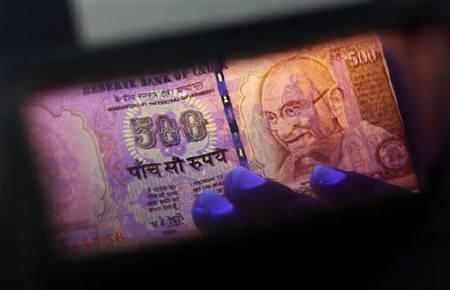

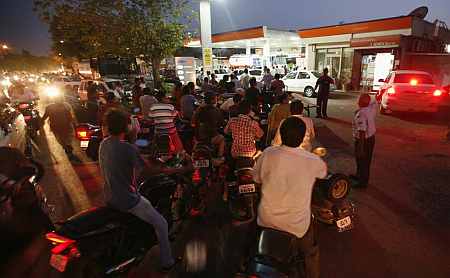
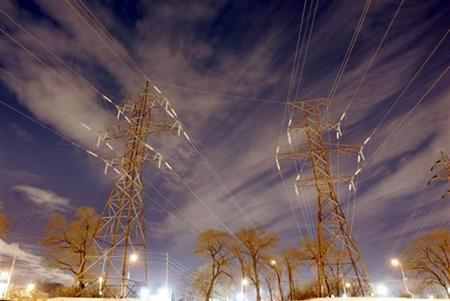
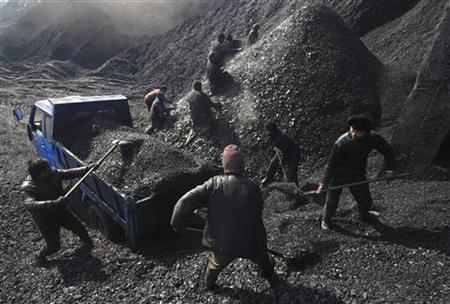
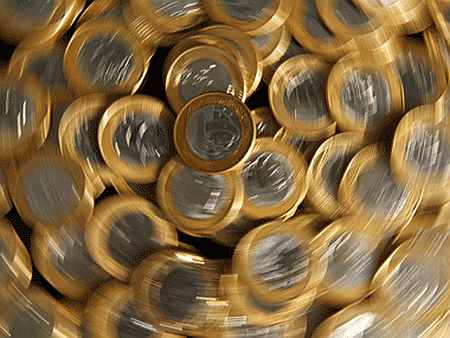
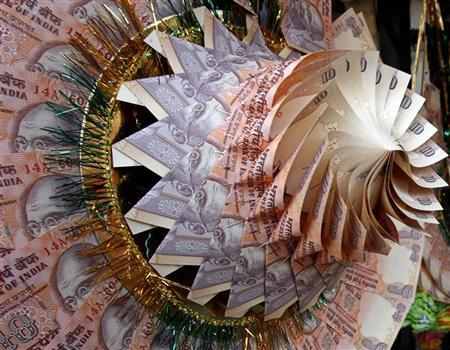

article